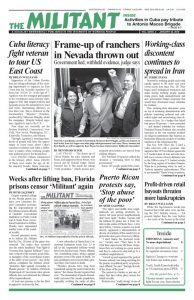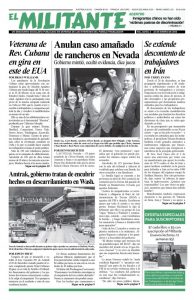HAVANA — During the Dec. 18-20 events here on the 40th anniversary of the Miami-based Antonio Maceo Brigade, delegates heard a special presentation on revolutionary Cuba’s response to Hurricane Irma. Col. Luis Angel Macareño, second in command of Cuba’s Civil Defense, explained that every time they face a dangerous storm, “our first priority is to protect people and their belongings, along with our country’s infrastructure and resources.” He reported that in Cuba there have been a total of only 66 deaths from 30 hurricanes and tropical storms over the last 20 years.
The U.S. visitors recalled that in contrast, more than 1,500 people died in Louisiana during Hurricane Katrina in 2005. Today in Puerto Rico, three months after Hurricane María, half the residents of the U.S. colony remain without electricity, and the real death toll is unknown — as the colonial authorities have tried to cover up the facts.
Macareño said Irma caused widespread destruction of housing, crops and infrastructure across much of Cuba. Ten people died, a higher number than usual given Cuba’s decadeslong record. The recovery, however, was relatively rapid because millions of Cubans and their leadership were prepared and organized.
Before the hurricane, nearly 2 million people were evacuated to safer ground, mainly to homes of other families. Brigades of electrical workers, dispatched as soon as the storm subsided, restored most electrical power within a week. In areas where schools were damaged, many working people volunteered their homes to allow classes to continue uninterrupted. Although some hospitals and clinics were affected, the system of neighborhood-based family doctors ensured that no one lacked access to basic health care.
The government quickly made supplies available to working people to rebuild their homes. Families were charged only 50 percent of the normal cost for construction materials. Long-term, low-interest loans were provided on the spot to cover that expense so no immediate outlay was necessary. In addition, Cuba sent volunteers and aid to storm-devastated Caribbean neighbors.
The U.S. rulers refused Cuba’s offer to send a team of 39 doctors, crews of electrical workers and other volunteers to help in Puerto Rico.
“Our motto is to abide by Fidel’s words — no one here is ever abandoned,” Macareño said in concluding his presentation. The audience, mostly Florida residents who suffered the callous disregard of U.S. government agencies in the wake of Irma, responded with applause.
The reason Cuba is able to prevent a natural disaster from becoming a social disaster as happens in other countries, Macareño underlined, is that “we have a social system that allows us to do this” — that is, a socialist revolution in which working people hold state power.

